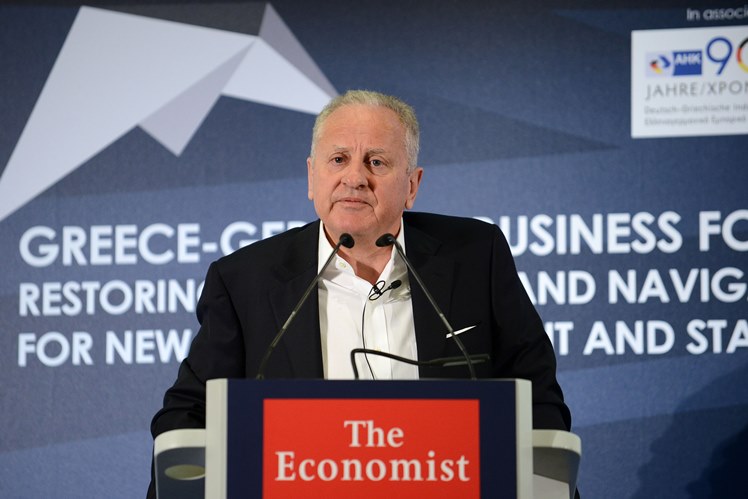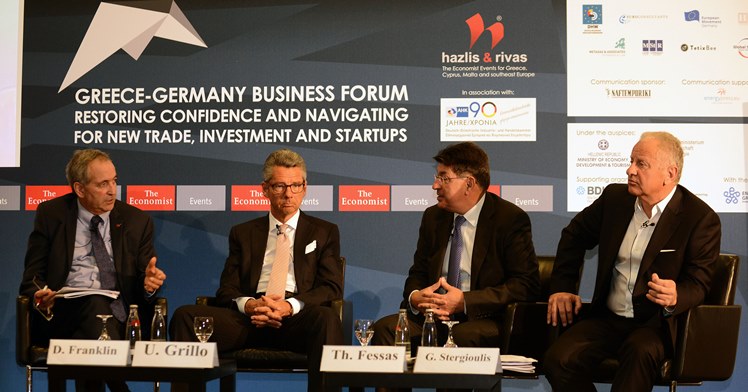 8 minutes
8 minutes“Restoring Confidence and Navigating for New Trade, Investment and Startups”
“The significance of Greece’s energy sector for growth and stability”
Grigoris Stergioulis, CEO, Hellenic Petroleum
Grigoris Stergioulis, CEO of Hellenic Petroleum, stressed the importance that the enegy sector holds for growth and stability in Greece, at a speech delivered during the Greece-Germany Business Forum, in Berlin this morning, titled: "Restoring confidence and navigation for new trade, investment and startups".
The International Forum is organized by The Economist, in association with the Greek-German Chamber of Commerce and Industry and under the auspices of the Greek Ministry of Economy, Development & Tourism and the German Federal Ministry of Economy & Energy.
The participants are representatives of the Greek and German governments, members of the business communities of both countries and executives, all discussing the reinforcement of the bilateral cooperation and the forging of trust through entrepreneurship.
Mr. Stergioulis took part in the "The Business Leaders Have the Floor" discussion, along with Mr. Ulrich Grillo, president of the Federation of German Industries and Mr.Theodoros Fessas, chairman of the board of directors at the Hellenic Federation of Enterprises.
Below is the full speech by Mr. Stergioulis, titled: "The significance of Greece’s energy sector for growth and stability".
Α. Hellenic Petroleum Group
Α. In general
The operations of Hellenic Petroleum Group of Companies include refining (75% of activities), petrochemicals (12,3%), engineering services, local and international trading, participation in electricity production, natural gas supply and distribution and renewables.
The Group is operating in five (5) countries and 60% of the products are exported. The South East European market is a highly competitive market, mainly due to the fact that the non EU-refineries operating in the area have high CO2 emissions, low salaries and low maintenance costs. According to the latest fitness test, the EU refineries lack by almost 4$/bbl against the Middle East refineries.
For 100.000 tons of CO2 emissions in a EU refinery, correspond almost to 130.000 tons in a non EU refinery.
On the top of that, HELPE Group is in an unfavorable competitive position due to the political situation in Greece, the capital controls and the reputation of the Greek Banking system. This creates an uneven cash flow and a non-competitive capital cost.
B. Vision
The companies of the future must as a minimum satisfy the following:
a. co-innovation
b. competitiveness
c. social awareness
C.1. Global developments
C.1.1. In a multipolar world
Since the early 1990s the modernization of Asia, in the context of the growing globalization defines to a great extend the global economy, which in the beginning of the 21st century, after the completion of the Eurozone stabilization, it is based on three basic pillars: America, Europe and Asia (driven by China).
For some, the modernization of Asia is considered alongside with the Renaissance and the Industrial Revolution one of the most significant developments in global economic history.
The combination of the technological progress’ globalization and the massive increase of debt levels in the developed world was the decisive factor for creating a large part of the wealth that was created globally in recent years.
C.1.2. Wealth is moving East
It is estimated that China and India in 2020 will produce more than 20% of global GDP versus 15% in the US, which in the early 1990s accumulated 22%, versus China’s and India’s 8,5%.
In the long term the Top 50 of the world’s financial centers will be dominated by cities like Delhi, Shanghai, Bombay and Beijing. By 2030 the percentage of the centers located in the US will be reduced to 6% from 22% in 1950.
C.1.3. Developments in the global economy in 2016
The developments in the global economy for 2016, is commonly accepted that, “are formed on the one hand, by the decisive influence of the phenomenon of climate change and on the other hand, they are formed by the structure and the operation of the development model of the contemporary period, the deregulation of the institutional frameworks of national economies and the dominance of the financial capital..", (World Economic Forum, 2015).
Furthermore, I would like to mention some events of major importance, with special emphasis on the developments in 2015: the termination of the seven year period of quantitative easing, the zero interest rates by the Federal Bank of the USA (Fed) , and the launch of the change of China’s economic model.
It is also evident that when it comes to formulating the future global developments, a key role will play:
The reorganization of the commercial routes in the framework of the Trans Pacific Partnership Agreement
Further strengthening of China’s role in the Asian continent, a part of which is the recent approach between China and Taiwan, but also
China’s planning of the Chinese Silk Road, which is of major importance for Europe and Western Asia
These events of major importance impose in Europe the need of reassessing the geopolitical factor, on which I would like to refer in more detail later on.
C.1.4. The geopolitical risks in 2016 overshadow the economic developments
“As geopolitical risks, according to political analysts from international leading banks, have risen to levels not seen since the days of the fall of the Berlin Wall in 1989, and at the same time the conflict in Syria is turning into one of the biggest geostrategic mazes, some analysts estimate that, it is politics and the geopolitical landscape that will be the greatest risks to the financial markets and not the financial problems.
D.2. The oil environment
The economic crisis resulted in a sharp decline in demand of petroleum products and refining margins, with a direct impact on the profitability of the industry worldwide.
The refining sector has entered a period of reorganization and redeployment worldwide. The economic crisis has forced many oil companies (such as ENI, Shell, Total, INEOS) to reevaluate their strategy by deciding to reduce their activities in certain countries, either by shutting down/shelling less competitive refineries or by turning their refineries into repositories.
Especially in Europe, 22 refineries of total capacity of 2.6 million barrels per day have terminated their operations since 2008, which amounts to 13% of Europe’s total refining capacity, of which 1,8m barrels per day involve EU Countries.
Instead, refineries in the Middle East and in Asia have increased their share on the global refining output by 30% between the years 2005 and 2014. (World Oil and Gas Review, 2015, p. 112-114)
Increased competition in the Mediterranean, among other factors, is particularly important for the competitive presence of the greek refineries, given that, as it was previously mentioned that, under the pressure of the shrinking domestic market, 60% of the production is exported.
In addition, non-EU refineries are not burdened with compliance costs, with products’ quality standards and acceptable environmental performances of the production activity, that apply in the EU. This fact combined with the absence of such standards in the non-EU markets, to which the majority of the industry’s products is addressed, disadvantages European and greek refineries, with the unfavorable prospect that this situation will worsen in the near future.
E.3. EU Energy Roadmap 2050
The European energy planning in force is espoused by the main decision to take action globally in order to tackle climate change. The main objective of decarbonisation is attempted to be reached with political commitments, actions and measures for:
High energy efficiency and energy saving
Competitive presence of differentiated emissions technologies, on the assumption that public accepts nuclear energy and carbon capture and storage technology (CCS)
High share of Renewable Energy Sources (RES), in order to constitute 75% of the gross final consumption and 97% of the electricity consumption by 2050 and last,
Low share of nuclear energy
F.1. Hellenic Petroleum’s role and strategy
The strong pressures on the refining industry mentioned above, highlight but also impose as the Group’s main medium-term objective, to ensure international competitive presence in the refining sector, which is a prerequisite for any planning or role searching in the recovery endeavor.
Ensuring the Group’s international competitive presence will be achieved by maintaining Hellenic Petroleum’s competiveness indicators among the top 25% of the most competitive refineries, which according to Solomon ranking, is the company’s primary objective and basic obligation towards its shareholders and it involves planning and implementing actions in areas such as the improvement of energy efficiency, integration of innovation and development of human capital (skills, expertise).
In the context of the medium term planning, Hellenic Petroleum Group adapts the European positions on the transformation of the energy system, innovative business models and reorientation towards actions related to energy and products of a new era (RES, gas networks, and electricity), while at the same time it strengthens its position in the oil industry as it is defined in the context of the European energy transformation.
HELPE has also gained significant experience in Exploration & Production activities, being a partner in 17 joint ventures with reputable oil companies during the last few years. As of 2014, Group’s activities are focused in Greece, through the participation as an Operator (50%) in the international joint venture HELPE UPSTREAM for the lease of the offshore region of Patraikos Gulf. Recently we have submitted offers in international tenders for another 5 oil promising blocks in Western Greece (3 offshore and 2 onshore blocks), so far obtaining the award of exploration rights for two areas.
It is a changing world. Many ideas will gradually fade out, some will change and some new will emerge. The consumer of tomorrow is a “smart consumer”. The gas station of tomorrow will be an energy supermarket selling hydrogen, gasoline, diesel, electricity and who knows what else.
In the refinery business it takes almost ten years for a new project to grow from the basic design to commissioning. It is our duty to analyze the energy needs of the 2025 citizen-consumer, design the energy products, produce them and distribute them. This entails the gradual transformation of the Hellenic Petroleum from a refinery to an energy group.
We take special pride, though, of our involvement in setting up a Refugee Temporary Hospitality Center on the island of Chios, which can accommodate more than 1,000 refugees in decent conditions. The so-called “HELPE Village” was put in operation last February, and was greeted very warmly by our employees, who are collecting basic necessity and personal hygiene items for the refugees. The current social environment of Greece needs these kinds of activities from big companies like us, and that’s just goes to show the strength and resilience of the energy sector not only in paving the way for the country’s economic recovery, but also in spreading and supporting the ideals of solidarity and human kindness to those in need.

Helpe CEO Grigoris Stergioulis at the podium of the Greece-Germany Business Forum. (photojournalist Vasilis Koutroumanos)

From left to right: Daniel Franklin, discussion moderator and Executive Editor at the Economist, Ulrich Grillo, President of the Federation of German Industries, Theodoros Fessas, CEO of the Hellenic Federation of Enterprises and HELPE CEO Grigoris Stergioulis. (photojournalist Vasilis Koutroumanos)